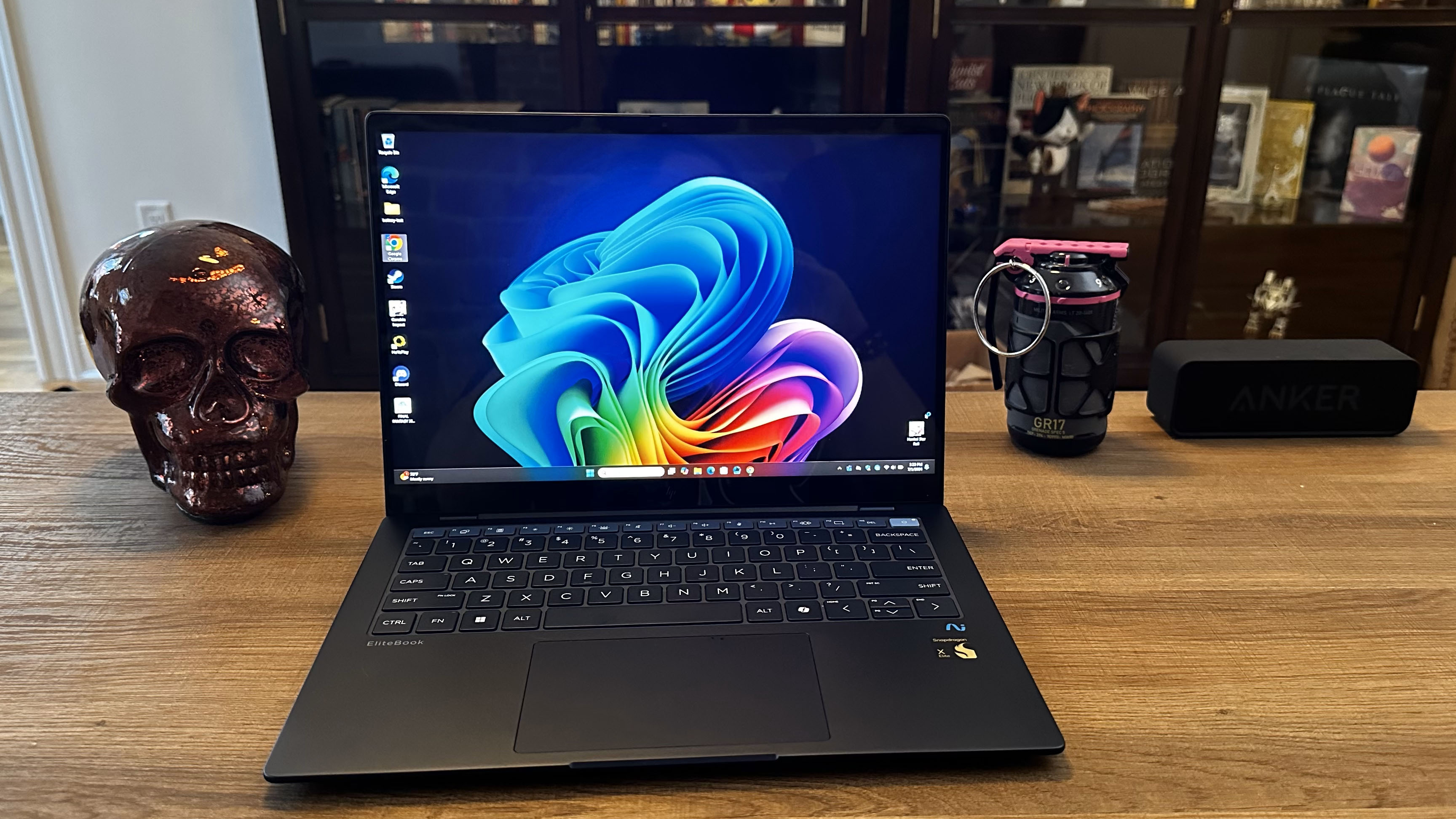
The HP EliteBook Ultra is the first Copilot+ PC business laptop to hit the market. Whether the infusion of AI wins you over or not, the EliteBook Ultra offers fast performance, over 16 hours of battery life, and a vibrant display. Now, do I have your attention?
The HP EliteBook Ultra features the new Qualcomm Snapdragon X Elite chipset, an ARM-based chip similar to what Apple moved to in 2020. The main drawbacks for Windows on ARM laptops have been app support and performance, but with the Snapdragon X Elite, that’s finally changing. Not only are more popular apps available natively, but a dramatically improved emulation platform allows other apps to run well on the powerful X Elite chips. Microsoft’s new AI-focused Copilot+ PC program and the Snapdragon X Elite chip are two potential game-changers, but both are untested, until now.
This raises the question: Is the HP EliteBook Ultra good enough to rank among our best business laptops or best 14-inch laptops?
HP EliteBook Ultra: Specs
HP EliteBook Ultra: Price and configurations
There is only one configuration for the HP EliteBook Ultra, which should simplify your buying experience. For $1,699, you get a Qualcomm Snapdragon X Elite XIE78-100 processor with the Qualcomm Adreno integrated graphics card and Qualcomm Hexagon NPU, 16GB of memory, 500 GB of storage, and a 14-inch 2.2K IPS-level display.
HP EliteBook Ultra: Design
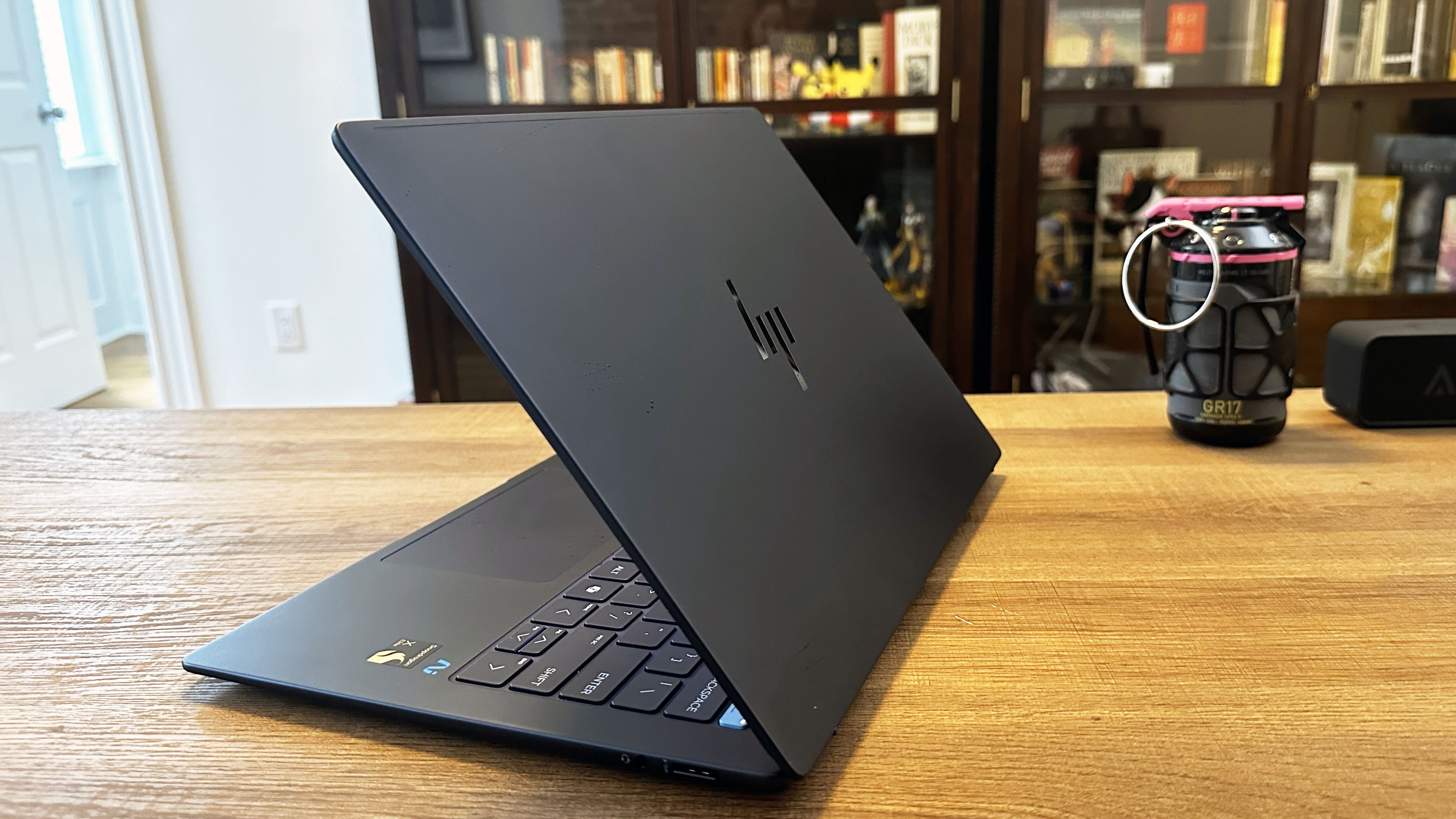
The HP EliteBook Ultra is an ultra-thin clamshell-style business laptop with an aluminum chassis in a deep Atmospheric Blue colorway.
The EliteBook is also part of HP’s sustainability program. It features 50% recycled aluminum in the cassis, 5% ocean-bound recycled plastic in the speaker box, and 50% post-consumer recycled plastic on the keycaps. The laptop is packaged in 100% sustainably sourced recyclable materials and earned an EPEAT Gold certification.
The EliteBook Ultra is incredibly portable, measuring 12.31 x 8.79 x 0.44 inches near the hinge and weighing 2.9 pounds. Whether you are a full-time or hybrid commuter or a frequent business traveler, you’ll have no trouble taking it with you on a hybrid commute schedule as it can easily fit in any backpack or laptop bag.
The HP OmniBook X, HP’s consumer-side AI PC, is a bit thicker and heavier than the EliteBook. The OmniBook X measures 12.32 x 8.8 x 0.57 inches and weighs 2.91 pounds. It’s still very portable, but the EliteBook is just that bit thinner and lighter. The Asus Zenbook 14 OLED (Q425M) is thicker and heavier than either HP Snapdragon laptop, measuring 12.3 x 8.67 x 0.57 inches and weighing 3 pounds. The Apple Macbook Pro 14 M2 is the thickest and heaviest of the group, measuring 12.3 x 8.7 x 0.6 inches and weighing 3.4 pounds.
Of course, none of these laptops will likely give you a persistent backache if you commute with it every day, as there is a difference of 0.16 inches and 0.5 pounds across the range. But the EliteBook Ultra is still the thinnest and lightest of the bunch, which is pretty impressive.
HP EliteBook Ultra: Ports
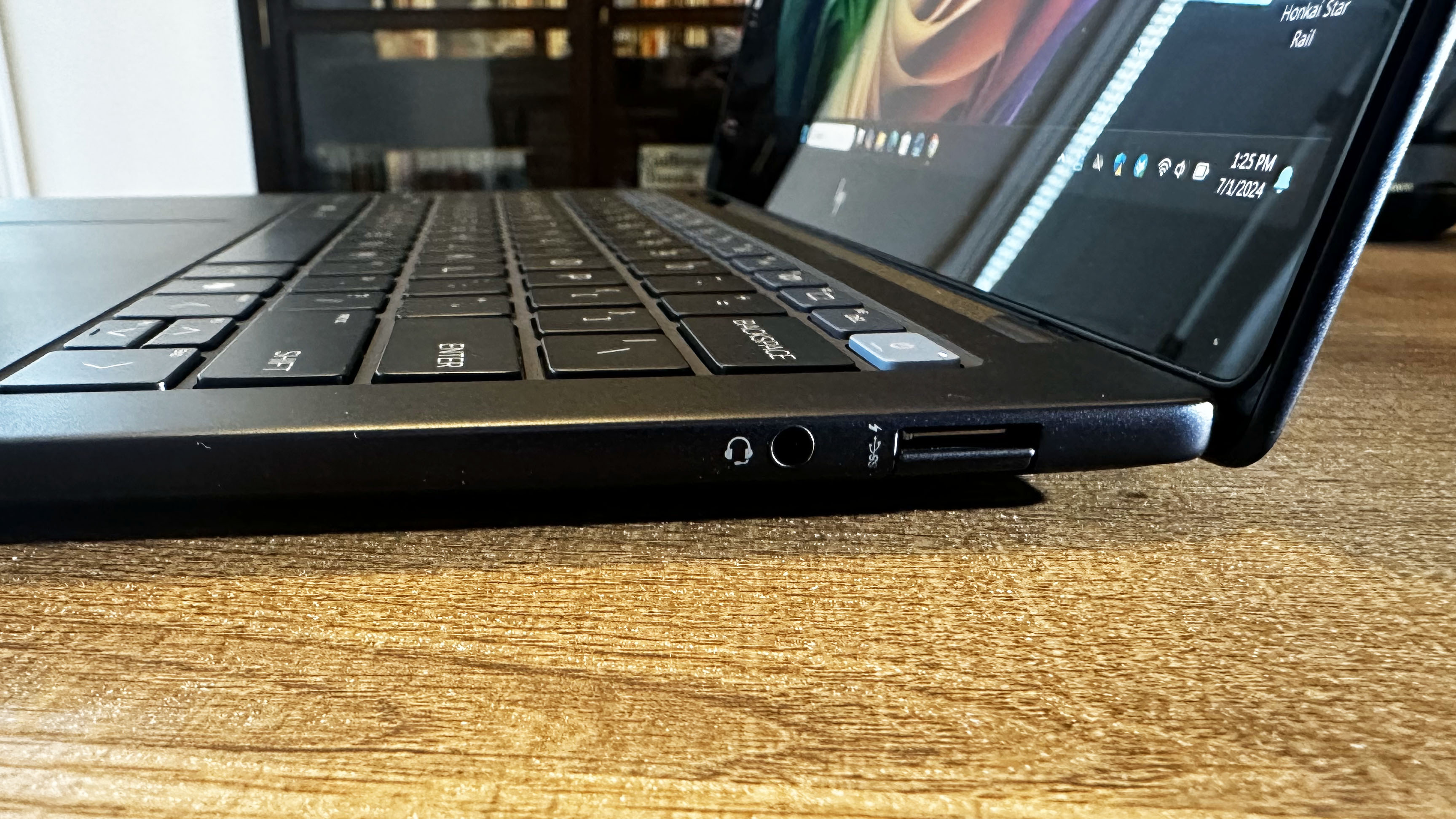
The HP EliteBook Ultra features one USB Type-C port with a 40Gbps signaling rate, one USB Type-C port with a 10Gbps signaling rate, one USB Type-A port with a 5Gbps signaling rate and power delivery, plus a 3.5 mm audio combo jack. This collection of ports should allow you to connect a monitor and accessories to kit out your workstation with the EliteBook alone.
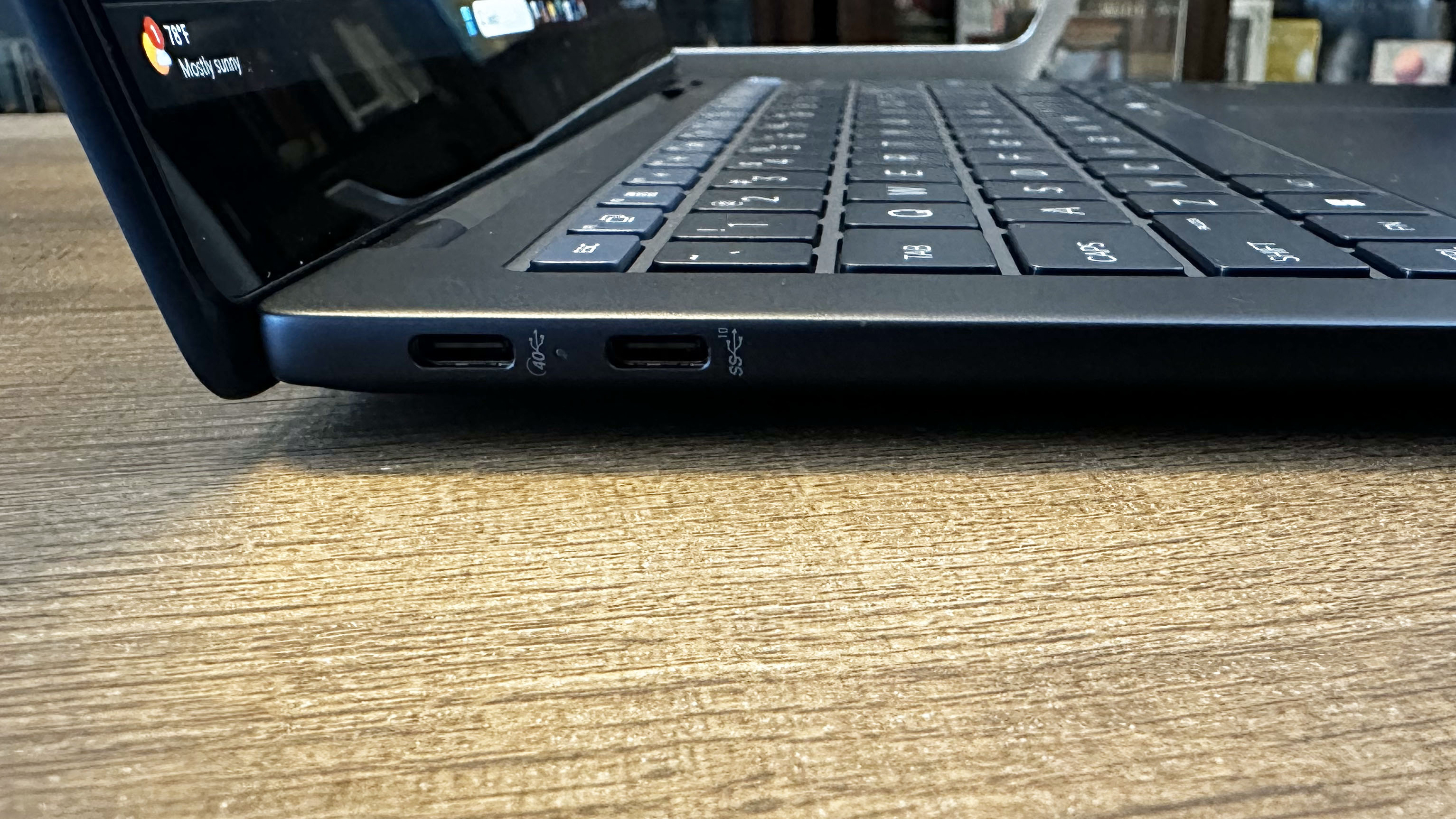
However, if you need a multi-monitor setup or have a favorite wired keyboard and mouse, you may need extra ports. In that case, we’d suggest investing in one of the best USB Type-C hubs or best laptop docking stations to kit out your workspace.
HP EliteBook Ultra: Security
HP has upgraded the Wolf Pro Security platform for the HP EliteBook Ultra, providing AI-powered antivirus software and threat detection. The EliteBook also has a 5MP webcam suitable for secure Windows Hello sign-in.
HP EliteBook Ultra: Display
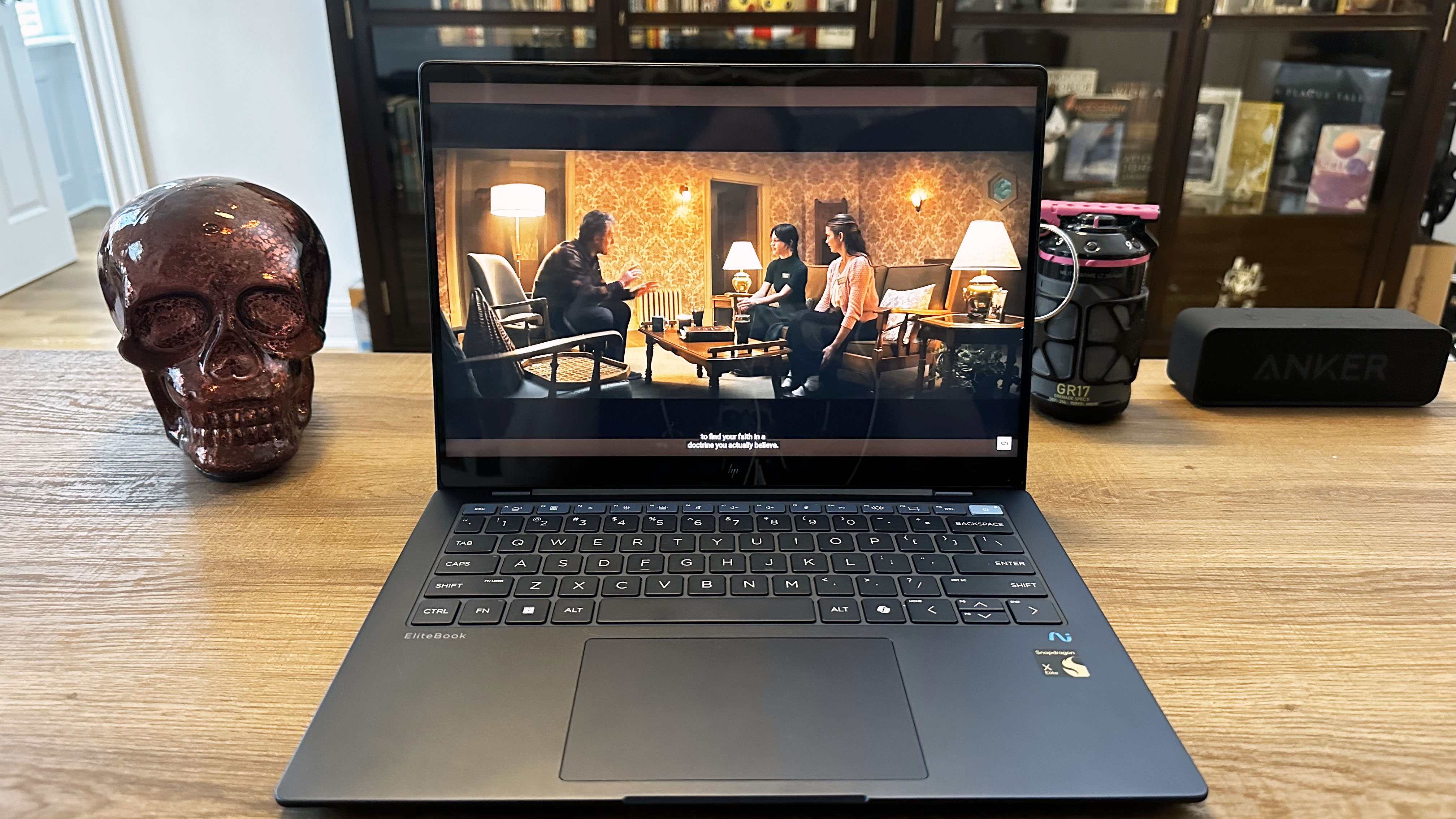
The HP EliteBook Ultra features a 14-inch 2.2K (2,240 x 1,400) IPS-level matte anti-glare display panel. While the EliteBook doesn’t break any of our display testing records, it does have a decent average brightness and a good amount of color gamut coverage compared to most business laptops.
Watching the trailer for A24’s horror thriller Heretic, the 2.2K IPS display easily captured the vivid colors of the small cottage and the deep shadows in each unsettling shot of Hugh Grant. Not a single bit of the trailer’s tension was lost due to the display quality.
The EliteBook Ultra’s display isn’t the brightest but bright enough to cut through most glares. According to our lab’s colorimeter, the EliteBook Ultra managed an average peak brightness of 321 nits, much brighter than the OmniBook X’s 283 nits average and just below the Zenbook 14’s 339 nits average. The Apple MacBook Pro 14 M3 was the brightest of the bunch by far at 558 nits.
As for vibrancy, the EliteBook Ultra covers 84.7% of the DCI-P3 color gamut with a Delta-E accuracy of 0.22, which is good for a non-OLED panel. The HP OmniBook X was a bit less vibrant, covering 80.2% of the DCI-P3 color gamut with an accuracy of 0.29, as was the Zenbook 14 OLED with 79.8% coverage and an accuracy of 0.23. The MacBook Pro’s Super Retina display was the most accurate (0.12) but still less vibrant than the EliteBook, covering 81.3% of the DCI-P3 color space.
HP EliteBook Ultra: Keyboard and touchpad
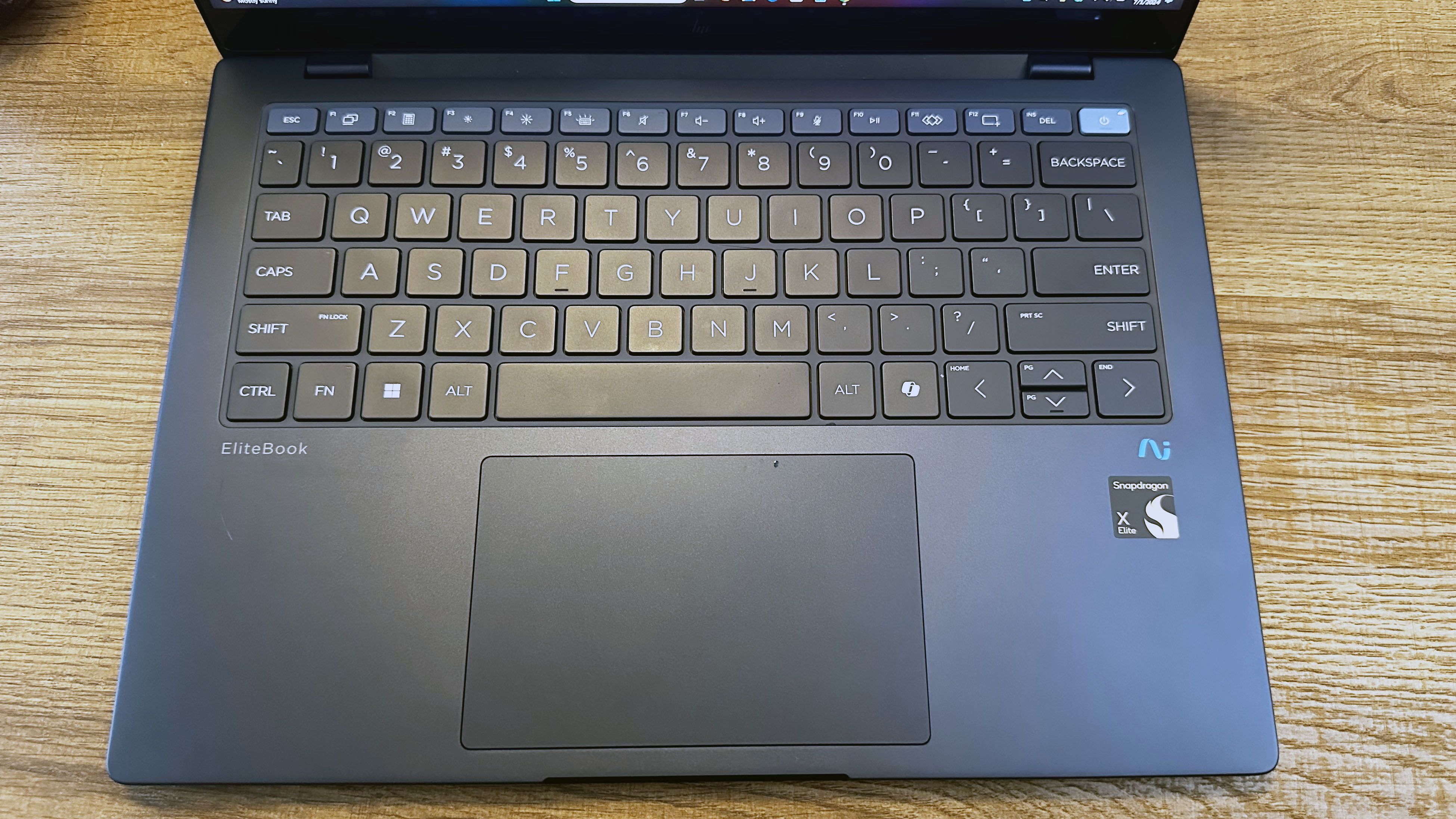
The EliteBook Ultra features a full-sized backlit keyboard and an HP Imagepad touchpad. The keyboard has large, well-spaced keys with a lower activation point, though you still have enough travel to avoid bottoming your fingers out on the keys.
On the 10FastFingers advanced typing test, I managed an average of 87 words per minute (WPM), which is just below the 88 WPM average I maintain on my MacBook Pro 14 keyboard.
The HP Imagepad touchpad is on the larger side, measuring 4.9 x 3.1 inches across. The gesture controls on the touchpad are smooth, and the palm rejection works like a charm, so you don’t have to worry about accidentally moving the cursor around while typing a long email or two.
HP EliteBook Ultra: Audio
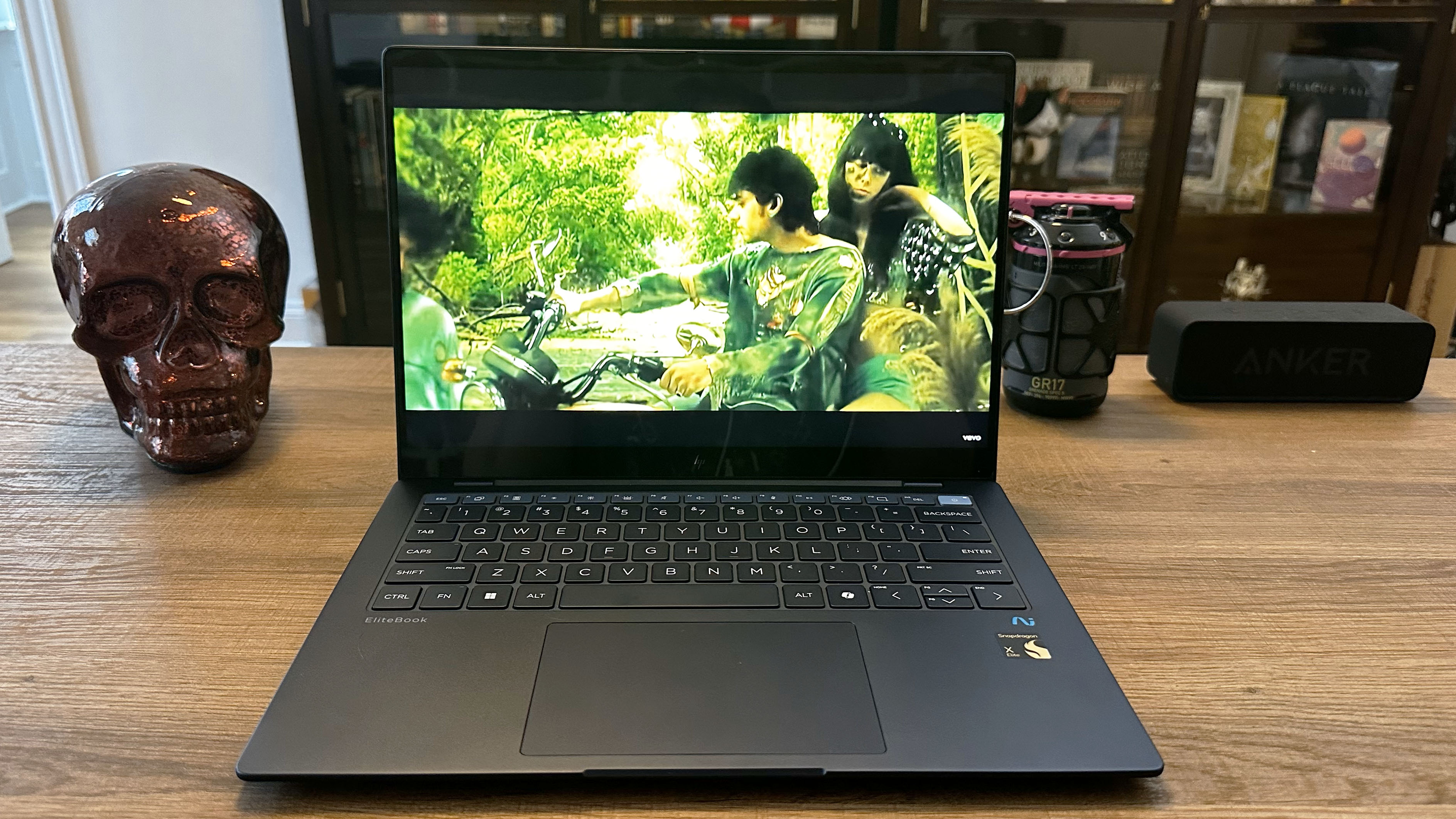
The HP EliteBook Ultra houses dual speakers with discrete amplifiers that produce a respectable volume. While they won’t be enough to fill a 2-bedroom apartment or small house, they’re more than enough for casual streaming binges or the occasional jam session.
Like most laptop speakers, you’ll have better sound quality with clean tracks. So The Longest Johns’ acapella sea shanty “Wellerman” sounds both crisp and deep, while MGMT’s indie cult hit “Electric Feel” has a slightly metallic tinge to the reverb. Both tracks were loud enough to fill a room at max volume, but the sweet spot for quality distortion was around 80 percent.
Of course, if you want immersive surround sound, you’d be better off using one of the best computer speakers instead of the onboard Poly Studio sound system.
HP EliteBook Ultra: Performance
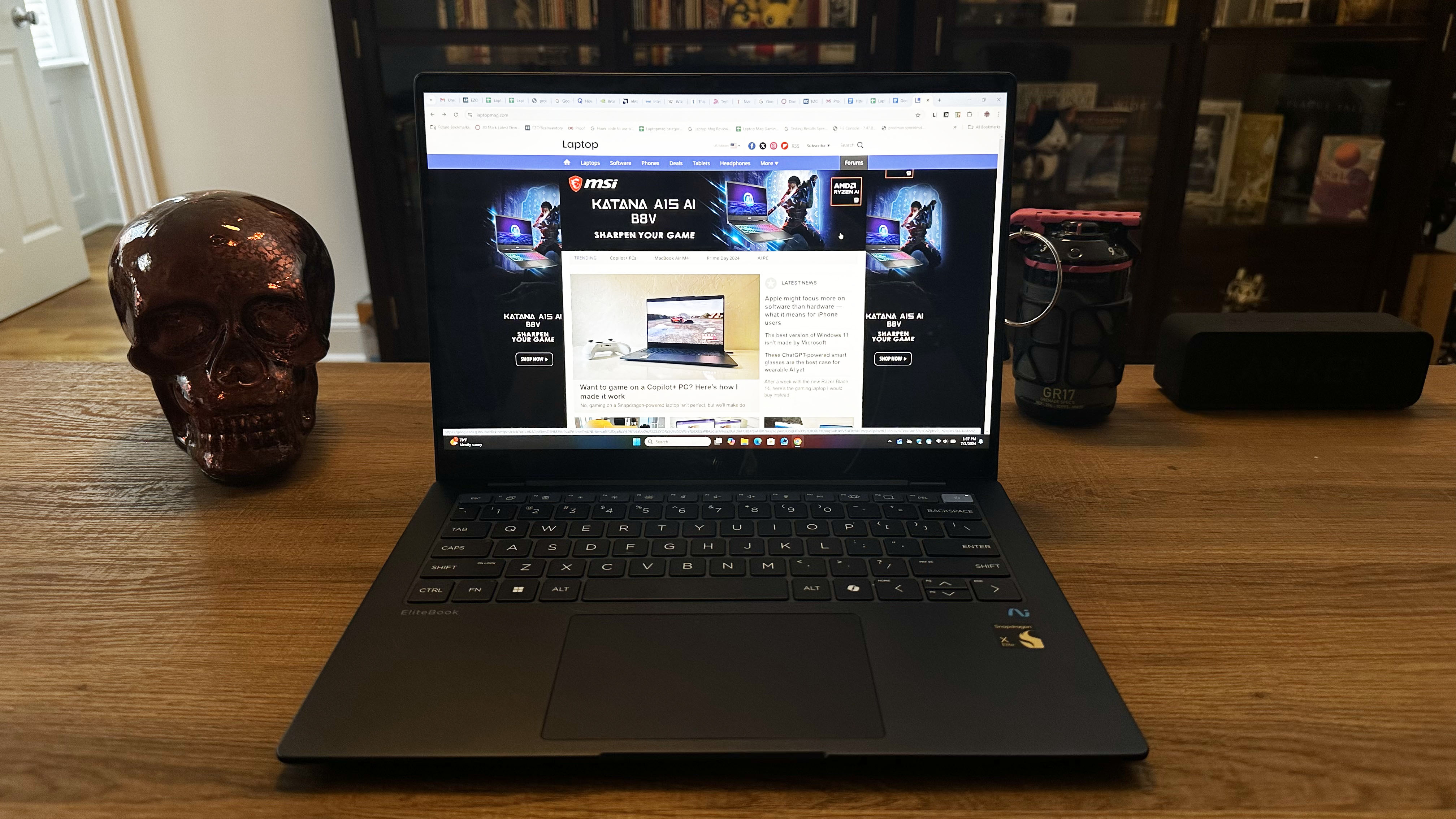
The HP EliteBook is a business laptop, so it will handle all of your usual work tasks rather well. Between my casual Photoshop editing and set of 20+ Chrome tabs, the EliteBook didn’t get sluggish as I went about my usual work day, even with Steam and the HoyoPlay updater running in the background.
I noticed the EliteBook was more sluggish responding in Photoshop than my MacBook Pro or Zenbook 14, but the software runs natively on ARM. Adobe has only moved Photoshop, Lightroom, and Lightroom Express to ARM, which can cause problems for creative professionals. While Adobe, Microsoft, and Qualcomm plan to move more Adobe programs like Premiere Pro and Illustrator to ARM chipsets in the future, the Adobe suite is a bit hamstrung for now.
My experience is supported by our lab’s general performance benchmark testing. On Geekbench 6’s CPU benchmark, the EliteBook maintained a single-core average of 2,371 and a multicore average of 12,717. The HP OmniBook X came in just above the EliteBook with a single-core average of 2,347 and a multicore average of 12,861. The Asus Zenbook 14 OLED performed similarly to the EliteBook, with a slightly higher single-core average of 2,453 and a nearly identical multicore average of 12,707. The MacBook Pro had the lead in single-core performance with a Geekbench 6 average of 3,163, though it fared the worst in multicore performance with a score of 11,968.
On our Handbrake video encoding benchmark, which takes the 4K version of Tears of Steel and exports it to a 1080p 30 FPS format, the EliteBook took 6 minutes and 40 seconds to complete the encoding. This is nearly one minute longer than the OmniBook X (5:46) and over one minute longer than the MacBook Pro (5:38), though it was just a bit faster than the Zenbook 14 (6:43).
Finally, on our file transfer test, which measures how long the laptop takes to copy a 25GB multimedia folder, the EliteBook took 37.7 seconds to complete the transfer at a rate of 712 Mbps. This is pretty grim compared to the OmniBook, which took 30.08 seconds to complete the transfer at 893 Mbps. The EliteBook took almost twice as long as the Zenbook 14 which copied the folder in just 21.7 seconds for a rate of 1,236 Mbps.
Because the EliteBook is running the Wolf Pro Security platform, HP indicated the laptop would take a slight performance hit because the security programs are working in the background, which explains the performance difference between the two HP Qualcomm laptops.
HP EliteBook Ultra: AI Performance and features
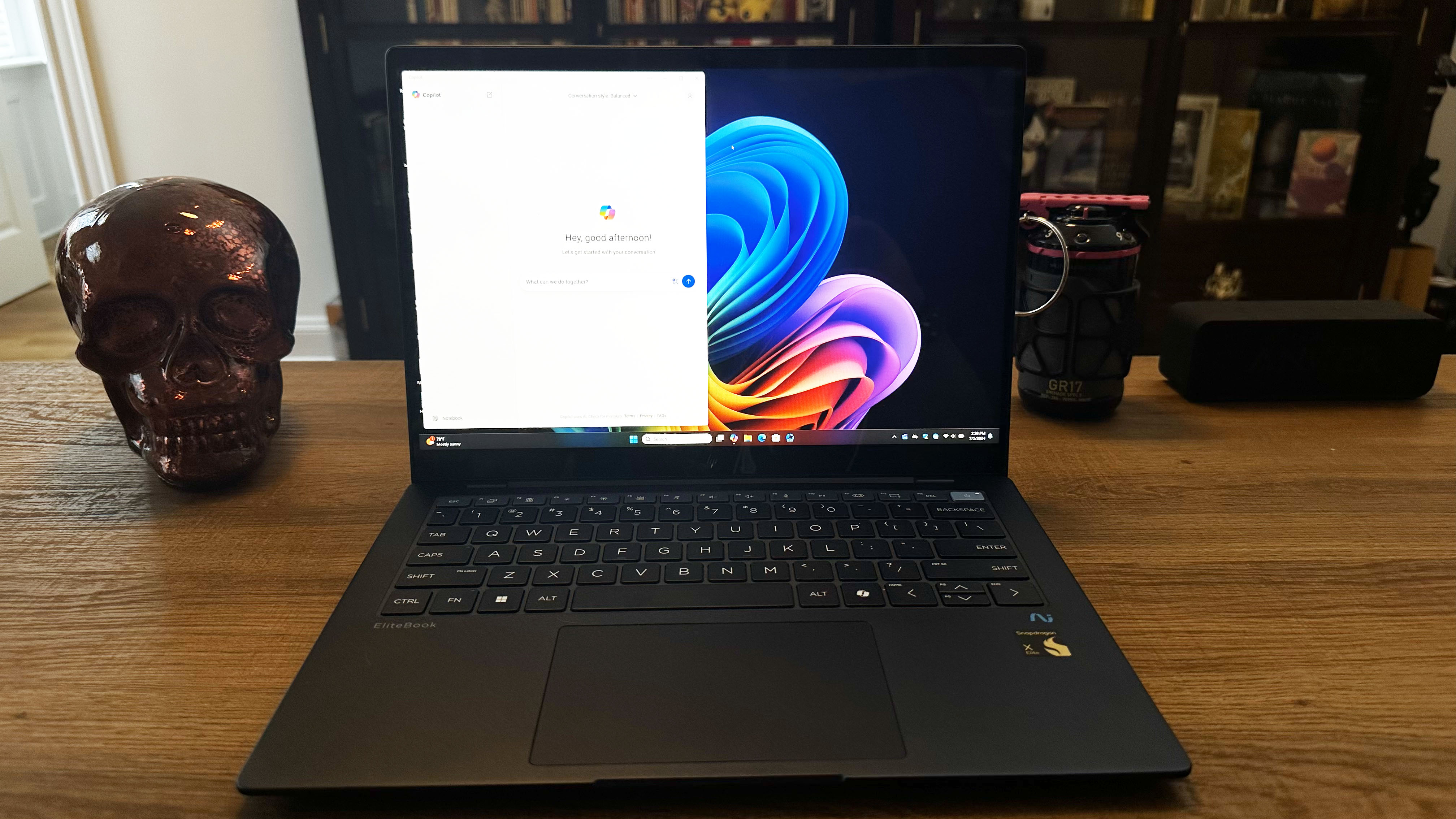
As part of the Copilot+ PC program, the HP EliteBook Ultra has access to all the usual Copilot+ features, such as Microsoft Co-Creator, enhanced Microsoft Studio effects, Live Captions, and the latest version of Microsoft’s Copilot AI assistant.
To gauge AI performance, we ran the EliteBook through the Geekbench ML CPU and GPU tests and the UL Procyon AI Computer Vision benchmark to test the capabilities of the laptop’s various AI accelerators.
On Geekbench ML’s CPU benchmark, the EliteBook averaged a score of 2,861, which was a bit above the OmniBook’s 2,572 average, while the Asus Zenbook 14 OLED managed a 2,971 average. On Geekbench ML’s GPU benchmark, the EliteBook averaged a score of 2,150, nearly identical to the OmniBook’s 2,148 score. The Zenbook 14 OLED fared far better on the GPU workload, with an average score of 3,929. So it seems the Zenbook’s Intel Core Ultra processor has the edge on CPU and GPU AI performance compared to the Qualcomm Snapdragon X Elite chip powering the EliteBook and OmniBook.
However, Qualcomm’s biggest claim on the Snapdragon chipset is the NPU performance, which we tested with the Procyon AI test. The EliteBook managed an average of 1,691 compared to the OmniBook X, which averaged a score of 1,693. So even with the EliteBook taking a slight hit to performance because of its increased HP Wolf Pro Security program, the two HP laptops offer nearly identical AI performance. Unfortunately, we did not test the Zenbook 14 OLED on the Procyon benchmark.
HP EliteBook Ultra: Graphics and gaming
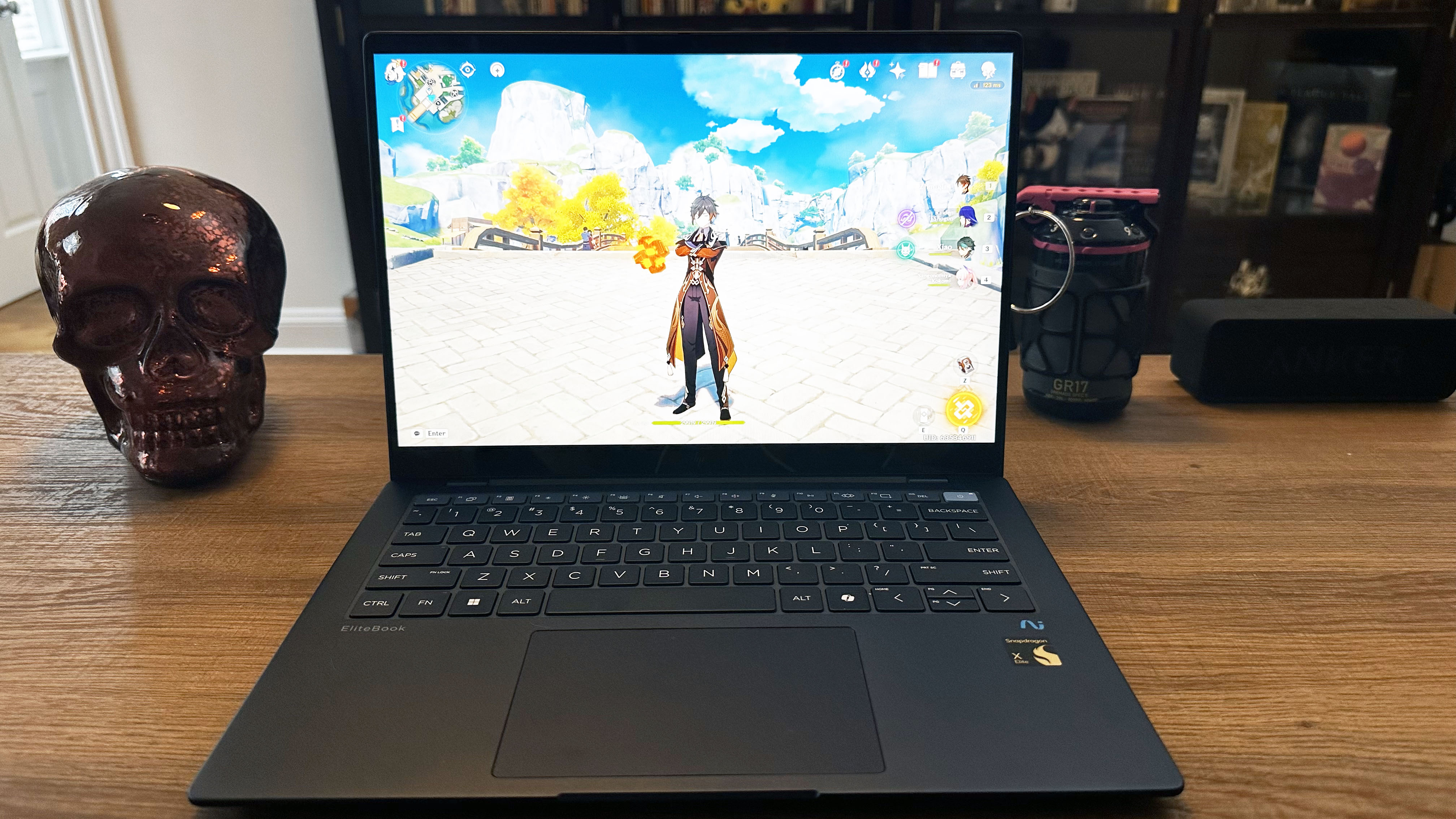
As an enterprise laptop, gaming performance isn’t likely to be of much concern on the EliteBook Ultra. However, if your job involves some graphics work or you just tend to get bored on business trips, we did some game testing on the EliteBook anyway.
I booted up Genshin Impact on the EliteBook to see how the Qualcomm Adreno GPU would handle a game tuned for your average smartphone. And to no surprise, the EliteBook could keep up relatively well with only minimal artifacting. So, if you want to do some casual gaming in addition to handling work tasks, the EliteBook can keep up. However, I wouldn’t recommend using it for something like Cyberpunk 2077.
On 3DMark’s Direct X 12 Time Spy benchmark, the EliteBook Ultra averaged a score of 1,807, nearly identical to the OmniBook X’s average score of 1,805. Since both HP laptops have the same Qualcomm Snapdragon X Elite chipset with integrated Adreno GPU, the fact that their scores are nearly identical makes perfect sense. The Asus Zenbook 14 OLED with its Intel Core Ultra 7 155H processor and Intel Arc integrated GPU fared better on 3DMark with a Time Spy average of 3,566.
On 3DMark’s cross-platform off-screen gaming benchmark Wild Life Extreme Unlimited, the EliteBook Ultra averaged a score of 6,043. It maintained a framerate of 36.2 FPS, while the OmniBook averaged a score of 6,098 and 36.52 FPS. The MacBook Pro 14, with its M3 10-core GPU, averaged a score of 8,297 and 49.7 FPS on Wild Life Extreme Unlimited.
For a more real-world experience, we also tested all four laptops using the Sid Meier’s Civilization VI: Gathering Storm graphics benchmark. The EliteBook Ultra managed an average frame rate of 20 FPS on medium settings at 1080p, identical to the HP OmniBook X (20 FPS). The Zenbook 14 OLED fared a bit better, with an average of 31 FPS, while the MacBook Pro offered a 51 FPS average, making this one of the few times a MacBook has had better gaming performance than the competition.
HP EliteBook Ultra: Battery life
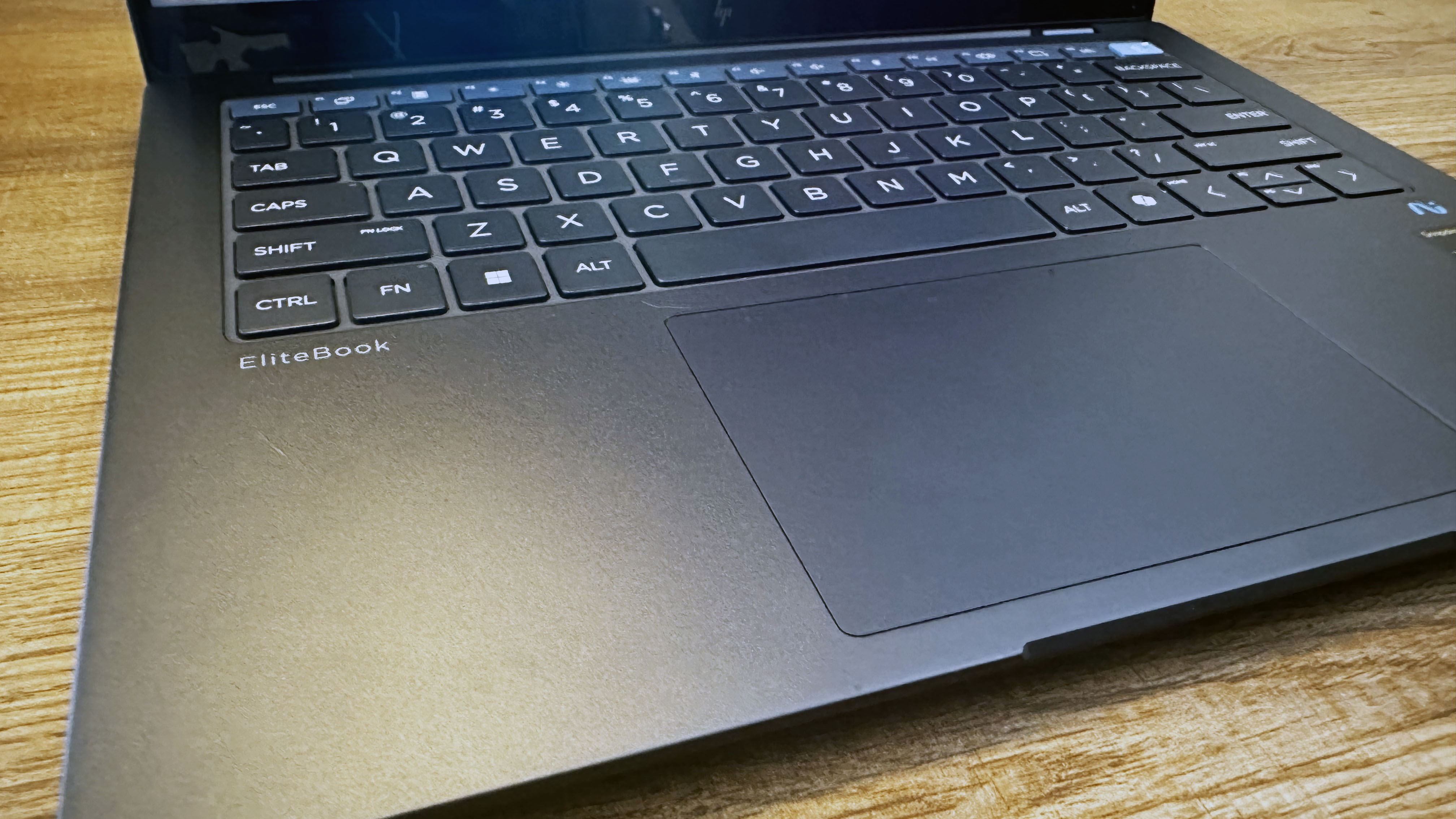
Battery life is often the main deciding factor with thin and light laptops, especially in the business environment. In today’s hybrid commuting environment, having a laptop that can last for an entire workday in case you forget your charger is more important than ever. And the HP EliteBook will last for quite a while. I had no problems going through my standard workday without needing to plug the EliteBook in, and I still had a good 35% of battery life left over.
On the Laptop Mag web surfing battery test, which sets a laptop to 150 nits of brightness and scrolls through a series of 20 static and video web pages, the EliteBook Ultra lasted an average of 16 hours and 1 minute. The HP OmniBook X lasted just a little longer at 16:17, possibly because the OmniBook doesn’t have the upgraded HP Wolf Pro Security system that the EliteBook runs. The Asus Zenbook 14 OLED had the shortest battery life at 15:52, while the MacBook Pro 14 had the longest battery life at 17:16. So all four of these laptops have the battery to sustain an entire workday on a single charge.
HP EliteBook Ultra: Webcam

The EliteBook Ultra has a 5MP IR camera, which is more useful for Windows Hello sign-in than video calls, but it does an alright job for the occasional video conference. The camera put a slight pink cast over my face and lost some detail in the grainy feed, but it was otherwise relatively accurate at depicting color.
The 5MP IR camera does have a shutter, so you can block off the webcam when you aren’t using it, providing an extra layer of webcam security.
But if your job involves a lot of video calls and virtual presentations, I recommend using one of our best webcams instead.
HP EliteBook Ultra: Heat
The HP EliteBook may get toasty after extended use, though its hottest temperature was 112 degrees Fahrenheit. While this is above the Laptop Mag comfort threshold of 95 degrees, the keyboard and touchpad stayed relatively cool after a 15-minute 4K video stream. The keyboard hit 100.5 degrees, while the touchpad maintained a rather cool 83 degrees.
The hottest point on the laptop is up at the function row, between the F2 and 3 keys, so you aren’t in danger of singeing your fingertips off while typing.
HP EliteBook Ultra: Software and warranty
HP's EliteBook Ultra has a 3-year (3/3/0) limited warranty that covers three years of parts and labor but no on-site repair.
If you want to see how HP customer service compares in our annual report, check out our Tech Support Showdown.
Bottom line
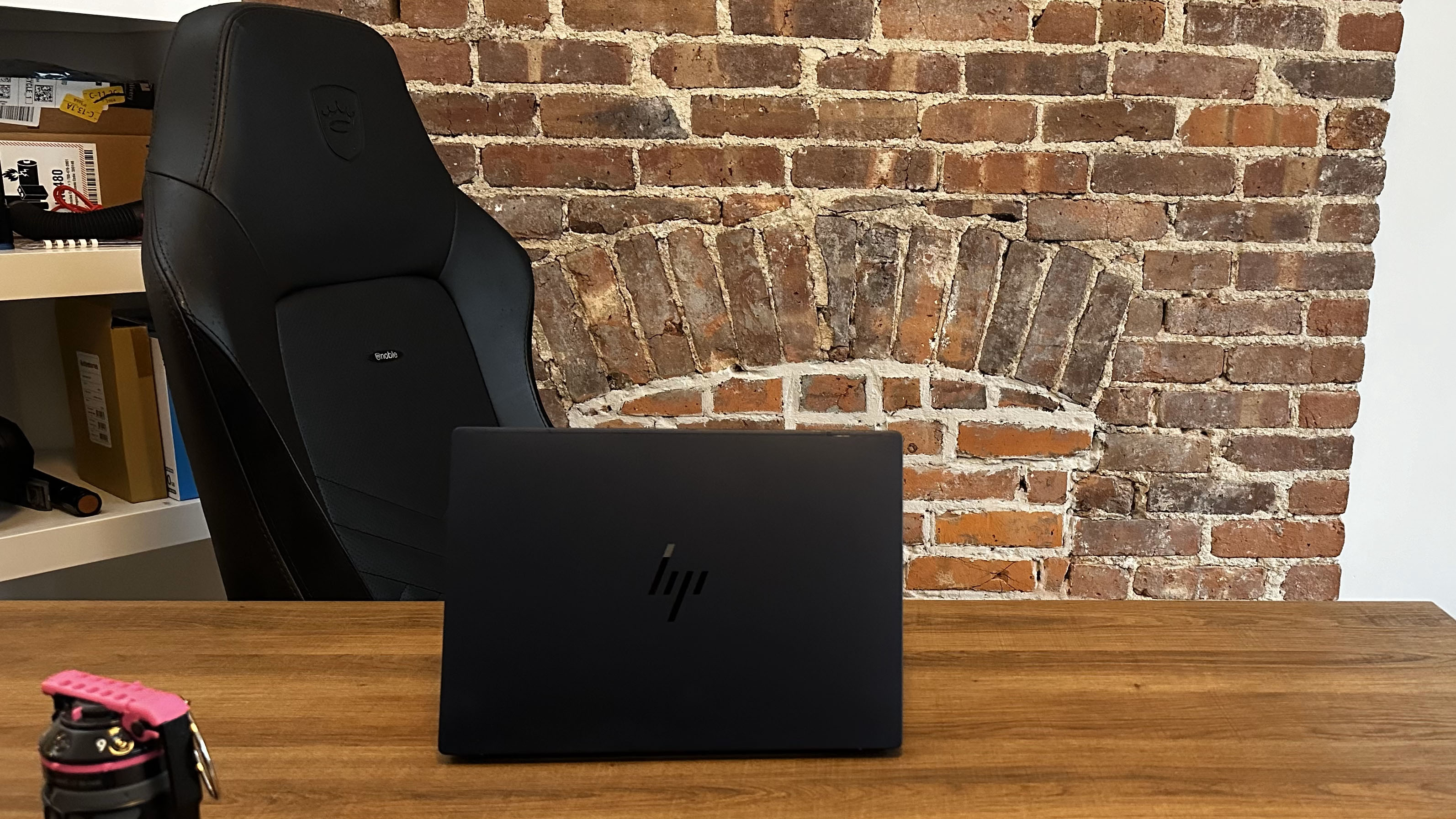
With the EliteBook Ultra, HP has made a fantastic case for why Windows on ARM systems are ideal for business professionals. Between the quality performance, impressive battery life, and vibrant display, the EliteBook can be kept up in most professional settings. While its poor graphics performance is disappointing, it will be fine for an enterprise machine.
The main issue holding the EliteBook back from taking over the business laptop market is the same thing that has hamstrung most Windows on ARM systems in the past: app support and emulation. While more applications are running natively on ARM than ever before, and the ARM x86 emulation software is better than ever, if you need certain specialized programs to do your job, it is probably better to stick with a more traditional Intel or AMD-powered Windows system.







